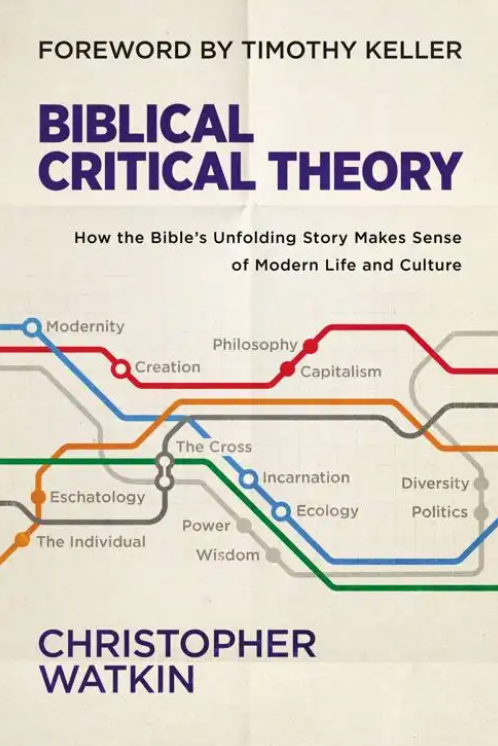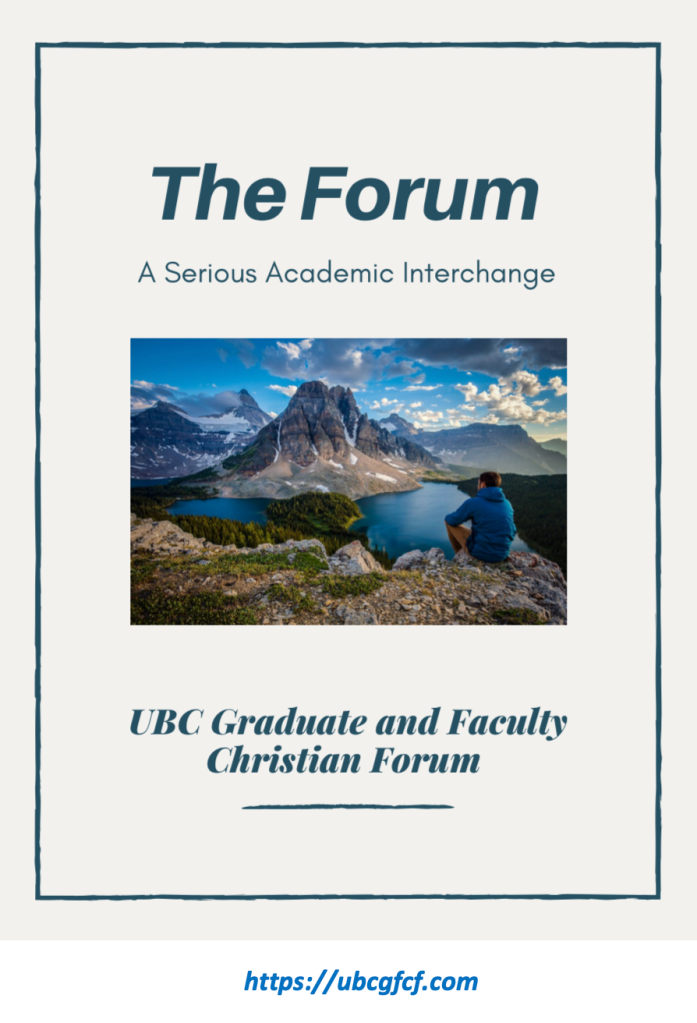Dialogue on key issues brings one’s graduate experience to life. Come and meet new friends at GCU & GFCF, stimulating interlocutors that could last a lifetime. Our biblical dialogue this fall will be from Paul’s letters to the Philippians and Colossians. Big Question as we enter the fall season of study, research, experimentation and debate, Can Faith & Reason Make Up and Become Friends? https://ubcgcu.org/2014/09/26/can-faith-and-reason-be-friends/
Abigail Favale, The Genesis of Gender
Christopher Watkin
Lecturer Monash University, Australia
Philosophy, Religion, Atheism, Humanity, Freedom
I make sense of how people make sense of the world
The Bible as a Tool for Changing Culture
Abstract
The question of the relationship between Christianity and culture increasingly takes centre stage in debates both within and outside the church today. This talk reflects on how a constructive, nuanced and—to many modern ears—fresh vision for contemporary society can be drawn from a rich engagement with the Bible’s storyline, guided by Augustine’s magisterial work City of God. What might it look like to reimagine Augustine’s mode of engagement with late Roman society in our own cultural moment of late modernity?
Biography
Christopher Watkin (PhD, University of Cambridge) is senior lecturer in French studies at Monash University in Melbourne, Australia. He is a scholar with an international reputation in the area of modern and contemporary European thought, atheism, and the relationship between the Bible and philosophy. His published work runs the spectrum from academic monographs on contemporary philosophy to books written for general readers, both Christian and secular, and include Difficult Atheism, From Plato to Postmodernism; Great Thinkers: Jacques Derrida. His recent impressive 2022 tome with Zondervan Academic is Biblical Critical Theory: How the Bible’s Unfolding Story Makes Sense of Modern Life and Culture.
Next in GFCF Abigail Favale, Professor in the McGrath Institute for Church Life, Notre Dame University on March 13, 2024. Topic: Examining the Sources of Gender: Why Sexual Difference Matters.
Abstract: How do contemporary theories of gender compare to the understanding of gender in the Christian imagination? This talk will provide a sketch of two distinct paradigms–the “gender paradigm” and the “Genesis paradigm”–and bring those two frameworks into conversation with one another, highlighting points of consonance and dissonance between them.
Biography: Abigail Favale, Ph.D., is a professor in the McGrath Institute for Church Life at the University of Notre Dame. She has an academic background in gender studies and feminist theory, and writes regularly about these topics from a Catholic perspective. She is the author of The Genesis of Gender: A Christian Theory (Ignatius 2022) and Into the Deep: An Unlikely Catholic Conversion (Cascade 2018), as well as numerous essays and articles. Abigail’s essays and short stories have appeared in print and online for publications such as First Things, The Atlantic, Church Life, and Potomac Review. She was awarded the J.F. Powers Prize for short fiction in 2017.

Andrew Paul Davison
Professor of Theology and Natural Science
Cambridge University
Abstract
Widespread scientific confidence in there being a natural origin of life, rather than a supernatural one, is a latecomer in the history of thought, held back as much by scientific considerations as by belief that this is more the purview of religion. Yet, over the course of the past century, a natural origin has become the default position. Surprisingly little theological thought has been given to that, with the mainstream churches taking a natural origin for granted, while some more conservative traditions hold out against the possibility. In this talk, Professor Davison will sketch this history, and argue that while Christian theology can take a natural origin to life in its stride, that deserves more attention than it often gets.
Biography
One of the founders of the Cambridge Leverhulme Centre for Life in the Universe, Andrew Davison is the Starbridge Professor of Theology and Natural Sciences at the University of Cambridge, and Fellow in Theology and Dean of Chapel at Corpus Christi College. He is the author of many books, including Participation in God: A Study in Christian Doctrine and Metaphysics and Astrobiology and Christian Doctrine: Exploring the Implications of Life in the Universe (both Cambridge University Press).
Astrobiology and Christian Doctrine available at Regent Bookstore.
Video of Dr. Davison on Plato & Theology https://www.youtube.com/watch?v=LMahVSGqZiY
“This is not a book that predicts the future. It asks only ‘What if there is life in the Universe, beyond the bounds of Earth?’ Does such a postulate influence Christian doctrine? There are two motives in the mind of the author: (i) to prepare the human community to be ready to receive and process future signs of life elsewhere and (ii) after a journey in unfamiliar territory, to return home with fresh eyes. In nineteen tightly packed chapters, Andrew Davison, a metaphysical realist, addresses theological implications of the 1995 discovery of an exoplanet orbiting another star like our own sun. Our understandings of creation, revelation, uniqueness, Christology, eschatology and much else are given a fresh coat of paint. This is a must read for all of us.” (Dr. Olav Slaymaker, Professor Emeritus Geography, UBC)
p.s. I am fascinated by Andrew’s book both in terms of it’s intellectual honesty and it’s identification with metaphysical realism. His careful discussion of the contemporary relevance of Aquinas is also new for me.
Regarding Life: “The emergence of life within the realm of the non-living is a shift of the highest significance. It is so profound, on a qualitative level, as to render quantitative comparison otiose…. Above all, Christian theologians would want to say that the Incarnation, even more than the presence of human life, crowns the extraordinary dignity of life on Earth, or the dignity of the entire cosmos.” (Astrobiology and Christian Doctrine, 81)
Regarding Knowledge: “Something objective underlies any true sense of things, whether in knowledge of a creature, or in a creature’s witness to God. It does not require a denial of contingency, however, or mediation when it comes to knowing…. However, none of those elements of contingency, mediation, or particularity need undo the realist sense that, at root, knowledge is a witness to reality, based on a reception from that reality. To be true, knowledge need only to be a faithful participation in it, a faithful reception from it.” (A. Davison, Astrobiology and Christian Doctrine, 129-30)
“[Life] infuses [the living thing] with an increased perfection, a more intense degree of being. We may say, therefore, that living things exist more intensely; they have a higher pitch of being: they are more. The flower growing unobserved and hidden in a crevice upon the highest mountain has greater interiority and intensity of being: it is more than the mountain, greater in its interior perfection than the giant and majestic beauty of the physical universe: it is more. In this light we may read Acquinas’ remark: nobilis cuiuscumque rei est sibi secundum sum esse [Every excellence in any given thing belongs to it according to its being].” (Fran O’Rourke, ‘Virtus Essendi: Being in Pseudo-Dionysius and Acquinas,’ Dionysius 15 (1990): 68-9.
“The distinction and multitude of things come from the intention of the first agent, who is God. For he brought things into being in order that goodness might be communicated to creatures, and be represented by them; and because his goodness could not ne adequately represented by one creature alone, he produced many and diverse creatures, that what was wanting to one in representation of divine goodness might be supplied by another. For goodness, which in God is simple and uniform, in creatures is manifold and divided and hence the whole universe together participates the divine goodness more perfectly, and represents it better than any single creature whatever.” (Thomas Acquinas, Summa Theologica, I.47.1)
New Books in 2024:
Gordon Carkner, Towards an Incarnational Spiritual Culture: Grounding our Identity in Christ. Wipf & Stock, 2024. See: https://ubcgcu.org/coming-soon/
Ross Hastings, God and Molecules: Chemical Evolution and Divine Providence. IVP Academic, 2024.
Many Thanks to the UBC Murrin Fund
More Info: https://ubcgfcf.com
GFCF October Lecture Now on YouTube: See Below!
October 3, 2023 @ 12:00 noon John Lennox, Professor Emeritus Mathematics, Oxford University. Artificial Intelligence and the Future of Humanity.
Response from Dr. Craig Gay, Regent College.
Abstract: Dr. Lennox offers a probing conversation centered on the current and future impact of artificial intelligence technology. He will discuss the current state of AI, its benefits, dangers and future implications. He will explain the current capacity of AI, its advantages and disadvantages, the facts and fiction. Will Artificial Intelligence usher in a new utopia or a surveillance society dystopia? How do we protect our privacy in an age of digitalization of everything and deep machine learning? He authored the book, 2084: Artificial Intelligence and the Future of Humanity (Zondervan, 2020).
Biography: John Lennox is Emeritus Professor of Mathematics at the University of Oxford. He is a bioethicist, philosopher, author, and Christian apologist. He has written many highly-regarded books on religion, ethics and the relationship between science and faith, which covers key developments in technological enhancement, bioengineering and AI. Over the past 15 years, Lennox has been part of numerous public debates defending the Christian faith, including debates with Christopher Hitchens, Michael Shermer and Richard Dawkins. He has lectured and given courses to enthusiastic audiences on science and Christian faith around the globe.
Are we happy with AI surveillance capitalism?
How does ethics catch up with the speed of technological innovation? What is morally essential to all humans?
What are the implications of moving beyond ‘Narrow’ AI to Artificial General Intelligence (transhumanism)?
How are we to understand the AI Religion of Neil MacCarthur?
Do we like Yuval Noah Harari’s idea of humans as ‘hackable animals’, with the potential of becoming like gods?
What kind of moral capacity is AI ever to have?
How does utopian ideology operate in the AI space?
Sample of Speed of AI Development https://www.youtube.com/watch?v=nnboHTfYsfk
Templeton Green College
3. February 7, 2024: Christopher Watkin, French Studies, Monash University, Melbourne, Australia. The Bible as a Tool for Changing Culture.
Abstract: The question of the relationship between Christianity and culture increasingly takes centre stage in debates both within and outside the church today. This talk reflects on how a constructive, nuanced and–to many modern ears–fresh vision for contemporary society can be drawn from a rich engagement with the Bible’s storyline, guided by Augustine’s magisterial work City of God. What might it look like to reimagine Augustine’s mode of engagement with late Roman society in our own cultural moment of late modernity?
Biography: Christopher Watkin (PhD, University of Cambridge) is senior lecturer in French studies at Monash University in Melbourne, Australia. He is a scholar with an international reputation in the area of modern and contemporary European thought, atheism, and the relationship between the Bible and philosophy. His published work runs the spectrum from academic monographs on contemporary philosophy to books written for general readers, both Christian and secular, and include Difficult Atheism, From Plato to Postmodernism; Great Thinkers: Jacques Derrida. His recent impressive 2022 tome with Zondervan Academic is Biblical Critical Theory: How the Bible’s Unfolding Story Makes Sense of Modern Life and Culture.
4. March 13, 2024, Abigail Favale, Professor in the McGrath Institute for Church Life, Notre Dame University. Examining the Sources of Gender: Why Sexual Difference Matters.
Abstract: How do contemporary theories of gender compare to the understanding of gender in the Christian imagination? This talk will provide a sketch of two distinct paradigms–the “gender paradigm” and the “Genesis paradigm”–and bring those two frameworks into conversation with one another, highlighting points of consonance and dissonance between them.
Biography: Abigail Favale, Ph.D., is a professor in the McGrath Institute for Church Life at the University of Notre Dame. She has an academic background in gender studies and feminist theory, and writes regularly about these topics from a Catholic perspective. She is the author of The Genesis of Gender: A Christian Theory (Ignatius 2022) and Into the Deep: An Unlikely Catholic Conversion (Cascade 2018), as well as numerous essays and articles. Abigail’s essays and short stories have appeared in print and online for publications such as First Things, The Atlantic, Church Life, and Potomac Review. She was awarded the J.F. Powers Prize for short fiction in 2017.








Leave a comment